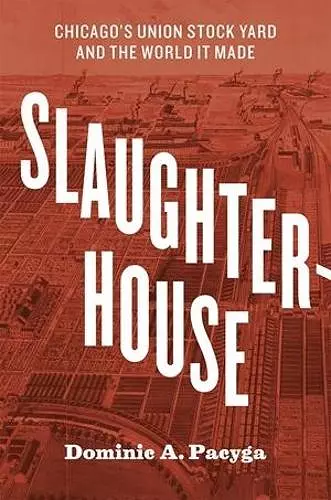Slaughterhouse
Chicago's Union Stock Yard and the World It Made
Format:Paperback
Publisher:The University of Chicago Press
Published:23rd Apr '18
Currently unavailable, and unfortunately no date known when it will be back

From the minute it opened--on Christmas Day in 1865--it was Chicago's must-see tourist attraction, drawing more than half a million visitors each year. Families, visiting dignitaries, even school groups all made trips to the South Side to tour the Union Stock Yard. There they got a firsthand look at the city's industrial prowess as they witnessed cattle, hogs, and sheep disassembled with breathtaking efficiency. At their height, the kill floors employed 50,000 workers and processed six hundred animals an hour, an astonishing spectacle of industrialized death. Slaughterhouse tells the story of the Union Stock Yard, chronicling the rise and fall of an industrial district that, for better or worse, served as the public face of Chicago for decades. Dominic A. Pacyga is a guide like no other--he grew up in the shadow of the stockyards, spent summers in their hog house and cattle yards, and maintains a longstanding connection with the working-class neighborhoods around them. Pacyga takes readers through the packinghouses as only an insider can, covering the rough and toxic life inside the plants and their lasting effects on the world outside. He shows how the yards shaped the surrounding neighborhoods and controlled the livelihoods of thousands of families. He looks at the Union Stock Yard's political and economic power and its sometimes volatile role in the city's race and labor relations. And he traces its decades of mechanized innovations, which introduced millions of consumers across the country to an industrialized food system. Once the pride and signature stench of a city, the neighborhood is now home to Chicago's most successful green agriculture companies. Slaughterhouse is the engrossing story of the creation and transformation of one of the most important--and deadliest--square miles in American history.
"For many people Henry Ford's 1913 Detroit assembly line is a symbol of technological triumph. This book shows that Chicago's 1865 disassembly line was an earlier more complete wonder, rapidly transporting animals, keeping them healthy and watered, dividing them into a wide variety of of products, communicating ownership and destination, and keeping meticulous accounts of all the processes. The speed and dexterity were put on display, proudly exploiting labor, advertising efficiency, making Chicago incredibly wealthy. This is a stunning account of the growth, complexity, rewards, and costs of modernity."--Garry Wills, author of Lincoln at Gettysburg "Pacyga has taken as his subject a single square mile, a small patch of urban land on the south side of Chicago, and has told an epic story--the rise of the Union Stockyards and Packingtown, their heyday as a great industrial complex and engine of modern America, their precipitous decline after World War II and their unexpected recent resurgence as a site of new industrial possibilities. It is a big story of rapid, and frequently unsettling, economic, technological, and social change, and Pacyga has told it in a vivid and compelling way."--Robert Bruegmann, University of Illinois at Chicago Winner--2016 "Illinois State Historical Society's Russell P. Strange Book of the Year " "Pacyga has written an intimate, elegant, fascinating, and informative story of one of America's greatest industrial complexes. As Pacyga shows, the dismal, exploitative, vibrant, and contested histories of the stockyards and the meatpacking factories are illustrative of both the fractured dynamics of American industrial capitalism and the rise and fall of the great industrial city of Chicago. Slaughterhouse is vital reading for all concerned with urban, industrial, and social history."--Robert Lewis, author of Chicago Made: Factory Networks in the Industrial Metropolis "Pacyga is the great bard of Chicago-historian, raconteur, social critic. Slaughterhouse is a critically important book about one of the city's epic neighborhoods."--Robert Slayton, author of Back of the Yards
ISBN: 9780226566030
Dimensions: unknown
Weight: unknown
256 pages